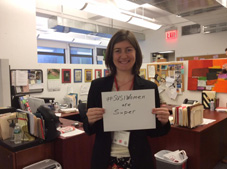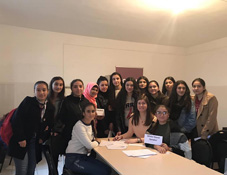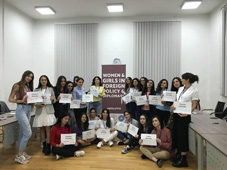
Women and Girls in Foreign Policy and Diplomacy – Project by Mariam Khatiashvili
By Mariam Chanishvili
Wednesday, November 14
Chairperson of American Studies Students’ Scientific Group at Tbilisi State University (TSU) and the United States Department of State’s exchange program alumna, Mariam Khatiashvili has launched an initiative - Women and Girls in Foreign Policy and Diplomacy (#WGinFPD), within the frames of the project " U.S. Foreign Policy and Model Diplomacy Seminars for Girls" funded by the U.S. Embassy Tbilisi Democracy Outreach/Alumni Program.
During her exchange time in the US as a foreign policy scholar, she had meetings at government, non-government and academic organizations focusing on US foreign policy, met with many inspiring American female experts working in the field of foreign policy and women’s issues, including Elmira Bayrasli, CEO of the Foreign Policy Interrupted, and Dina Refki, director of the Center for Women in Government & Civil Society.
The participants of the project #WGinFPD that she created as a part of her USG exchange experience include the future representatives of the halls of diplomatic, political, social and economic power of Georgia. Through this project, they are provided with the structured training and mentorship to explore the field of US foreign policy and diplomacy in order to equip themselves with skills necessary for modern life.
Specifically, project seminars focus on the historical and contemporary review of US foreign policy and diplomacy and the role of women key players in these fields. Through the seminars, participants are involved in US model diplomacy activities and discuss challenging foreign policy issues, i.e. cybersecurity, international migration, climate change, NATO expansion, etc.
The Messenger had a chance to interview Mariami Khatiashvili, discuss her project and talk about future plans.
-What is the main goal of your project and why did you decide to choose this particular format?
The cutting-edge project “Women and Girls in Foreign Policy and Diplomacy” I created as a part of my U.S. exchange experience is a multiplex program funded by the U.S. Embassy Tbilisi Democracy Outreach/Alumni Program grant.
To tell you the truth, through my career I always wanted to implement a project that would meet the tangible needs of Georgia by educating, inspiring, empowering and connecting girls who are the future female global leaders from the country. So I began my life’s dedication to academic and civic engagement, which has been strengthened by my U.S. Department of State’s exchange program experiences through the Study of the U.S. Institutes (SUSI) for Scholars on U.S. Foreign Policy in 2017 at Bard College, NY. I am one of the luckiest people on earth as I was the one from Georgia to be selected to participate in this program in 2017 among the wonderful group of scholars from 17 different countries globally.
I credit my USG exchange experience with building my confidence, opening my eyes to the possibility that I could make a difference, giving me the life-changing and transformative skills and savvy to advance gender equality and the empowerment of women and girls through U.S. foreign policy and diplomacy in my home country.
During my US exchange time, through participant-led discussions, expert speakers and other activities I had a chance to explore the elements that make multidimensional and multilayer U.S. foreign policy system powerful and exemplary. One of the central issues in U.S. foreign policy is women’s issues. There might be some gender-based barriers in the U.S. society, but academic, civic and political engagement guarantees the individual women’s voices to be fully heard and their experiences to be heeded. If we the citizens want to contribute to global peace, security and prosperity we need to advance gender equality in our community.
Nowadays academic, civic and political engagement is inextricably linked as never before. So the specific format of this project combines these three pillars of engagement to create and sustain reciprocal programs and relationships with girl students from Georgia locally, nationally, and globally.
During the U.S. model diplomacy activities project participants draft foreign policy memos and experience leadership, negotiation, decision-making, policy-making, peace-building, solution-making, conflict resolution roles. Through the academic and personal mentorship, they are working on project related presentations to present in American Corners located in Georgia. This project format includes meetings with the U.S. diplomats working at the U.S. Embassy Tbilisi and Skype-conferences with the leading professors and scholars from the U.S. and around the world to discuss women leadership related topics.
-What are the major steps in your project plan?
The list of this project activity is long and it is hard to briefly sum up all multitude outreach projects, but the main issue here is that it all aim to give participants a better understanding of the world around them through U.S. foreign policy seminars.
Major steps in this project plan include the series of publications in Georgian, English and Azerbaijani on the women, who shaped the U.S. foreign policy and diplomacy and a policy paper outlining the role of women participation and leadership in the field of Georgia’s foreign policy, diplomacy, decision making and peacebuilding process; and a student conference on the issues related to the women in foreign policy and diplomacy.
All these steps are developed in order to better serve the interests of Georgia, including academic, civic, diplomatic and political.
-What are the challenges regarding these topics in Georgia nowadays?
We need to better acquire women’s issues through academic, civic and political engagement in Georgia. For example, despite some efforts in recent years to improve gender quotas in Georgian political life, the meaningful role of women in Georgia’s main foreign policy challenges - security, regional and international stability, Russia’s propaganda, etc., seems to remain significantly diminished compared to that of men.
Unfortunately, due to many existing gender-based stereotypes, some people in Georgia think that the field of foreign policy and diplomacy is a men’s world, hereby leadership positions in these fields are also considered as a men-dominated sphere. There are also university students in Georgia who were told at schools that political science and international relations are “inappropriate fields” for girls.
Though there might be gender-related barriers and challenges in many fields of life in Georgia, the positive options to reduce and diminish them are more. Here positive changes can be made through academic, civic and political engagement.
Briefly, these upon mentioned issues are the reasons why I decided to create such a vibrant and sustainable project in Georgia.
Georgia’s stable society and peaceful future cannot be built without women’s participation in various foreign policy processes. On the other hand, utilizing new diplomacy is vital to Georgia’s present and future foreign policy aspirations, protecting national interests and ensuring national security. In order to achieve all these goals, individual female voices, especially of young, aspiring, emerging female leaders should be strengthened. This is what this project aims to.
-What are your career and project goals for the next six months?
My career and project goals are intertwined. These include the projects and activities to foster U.S. Studies in Georgia through academic and civic engagement. As a U.S. foreign policy scholar, my research interests include but are not limited to public diplomacy and soft power. Hence, being involved in the activities related to these issues in the academic and non-academic life is some of my career goals as well.
Advancing women’s rights and empowerment of women and girls through U.S. foreign policy and diplomacy is central to this. Project participants are the high school and university students, from various academic fields and levels, including but not limited to the American Studies, Law, IR, Political Science, Economics, etc. These girls are on their career path and this program helps them to be leaders of tomorrow.
Today #WGinFPD reached over 70 girls through program activities and over 1000 social media users. Through this program, many of them, especially ethnic minority Azerbaijani youth girls chose American Studies and IR as their undergraduate or graduate major, wrote research papers and presentations on U.S. foreign policy, diplomacy, women’s issues, started their new civic projects on women leadership and gender equality. The project already has many success stories of its participants.
During this program multi-generational, multi-disciplinary group of girls which also reflects the diverse cultural and ethnic composition of Georgia are educated, empowered and equipped with new tools and networks to continue engaging in the aspects of foreign policy and women’s issues. They connected with each other and built links of mutual interests, many of them are working together on the exciting future projects. These are the growing tendencies of this project which will drive the short and long-term positive changes in Georgia.
Mariam Khatiashvili is a Ph.D. candidate in American Studies at Ivane Javakhishvili TSU, Georgia. She holds BA and MA degrees with honors in American Studies from TSU. She has been a chairperson of American Studies Students’ Scientific Group at TSU since 2012. Ms. Khatiashvili is an alumna of the United States Department of State’s exchange program Study of the United States Institutes for Scholars on U.S. Foreign Policy at Bard College in Annandale-on-Hudson, New York (2017).




